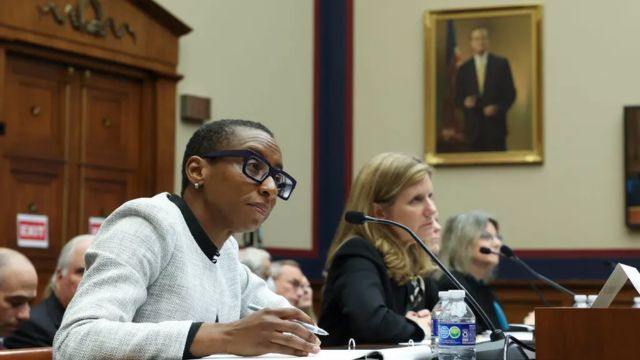
Stefanik Leads GOP Charge Against Elite Universities, Exposing Threats to Academic Freedom in Ackman’s Resentment-Fueled Campaign
In the intense two-month tussle surrounding Harvard’s president, billionaire investor William A. Ackman positions himself as a defender of Jewish students and a champion for those critical of liberal orthodoxy on college campuses.
However, beneath the surface, Ackman’s ire is fueled by personal grievances that predate the recent campus turmoil sparked by the Oct. 7 attack by Hamas on Israel and subsequent events in Gaza. Ackman openly admits and others confirm that he harbors resentment because officials at his alma mater, Harvard, where he has generously donated tens of millions of dollars, and its president, Claudine Gay, have not taken heed of his advice on various matters.
Most recently, this involves navigating how to address complaints of antisemitism and the looming threat of violence against supporters of Israel on campus.
Expressing his perspective, Mr. Ackman shared in an interview, “It would have been smart for her to listen, or to at least pick up the phone,” recounting a recent attempt to reach out to Dr. Gay. This outreach was part of a continuous stream of calls, texts, and letters directed at university officials.
On Tuesday, Harvard’s board made a decisive announcement that Dr. Gay, the institution’s first Black president, would retain her position despite fervent calls for her removal. Although Mr. Ackman’s campaign, which included the controversial accusation that her hiring was influenced by race and gender, did not achieve its primary goal, it did leave an indelible mark.
Ackman succeeded in shaping the discourse on antisemitism within universities and underscored questions about the influence of major donors in steering the trajectory of elite institutions. Despite the contentious nature of his efforts, he maintains that he aims to be a “positive force” at the school.

Concerns over the perceived influence of a wealthy alumnus sparked a campaign supporting Dr. Gay. Despite this, Mr. Ackman retains backing from certain campus factions, notably Jewish groups critical of the university’s response to the Hamas attack and its handling of threats against Jewish students. Ackman highlighted his engagement with 230 Jewish students in a recent town hall during a campus visit.
Rabbi Hirschy Zarchi of Harvard Chabad, a host to Mr. Ackman on campus, remarked, “When the history of this moment is written, Bill will be a part of it.”
In his distinctive approach, Mr. Ackman, an active presence on social media with nearly one million followers, stands out as a rare high-profile donor publicly challenging Harvard. Unlike others, such as financier Kenneth Griffin, who express their viewpoints discreetly, Ackman positions himself as a public adversary.
Over the weekend, the University of Pennsylvania’s president, M. Elizabeth Magill, resigned amid organized resistance from influential alumni. Last week, at a congressional hearing, a controversy ensued when Ms. Magill, Dr. Gay, and Sally Kornbluth, the president of MIT, appeared to sidestep questions about whether students should face discipline for advocating the genocide of Jews.
Bill Ackman, according to Chris Rufo, a senior fellow at the conservative Manhattan Institute for Policy Research, is the catalyst behind the backlash against institutions. Rufo, known for his criticism of university diversity programs and critical race theory, lauded Ackman as an “elite defector.” This sentiment resonated with several Harvard donors who supported Ackman’s goals but hesitated to voice their approval publicly, fearing potential harm to their relationship with the school.
On the contrary, Ben Eidelson, a Harvard Law School professor, holds a different view. Eidelson characterizes Ackman as “an interloper,” arguing that the university’s functionality would be compromised if it became answerable to arbitrary wealthy individuals and the online mobs they could mobilize on platforms like Twitter.
At 57 years old, Bill Ackman boasts an estimated fortune of $3.8 billion, as reported by Forbes. Despite a history of supporting Democrats through donations, he’s best known for founding the hedge fund Pershing Square Capital. Ackman has engaged in high-profile battles against companies he deems mismanaged, including a billion-dollar bet against Herbalife, which he labeled a fraud—though the allegations were never proven. Notably, during the onset of the Covid-19 pandemic in 2020, he earned $2.6 billion by predicting a stock market downturn.
In recent years, Ackman has weighed in on diverse and contentious public issues, spanning the pandemic and Russia’s attack on Ukraine to the collapse of Silicon Valley Bank, the presidential campaign of Robert F. Kennedy Jr., and events surrounding Elon Musk. Reflecting Pershing Square’s playbook, Ackman demonstrates a commitment to exerting significant pressure to bend companies to his will.
Despite contributing tens of millions of dollars to Harvard over the years, Ackman doesn’t rank among the school’s top donors, given Harvard’s history of attracting nine-figure donations. His most substantial contribution dates back to 2014 when he and his then-wife announced a $25 million donation to expand the economics department and establish three endowed professorships.

